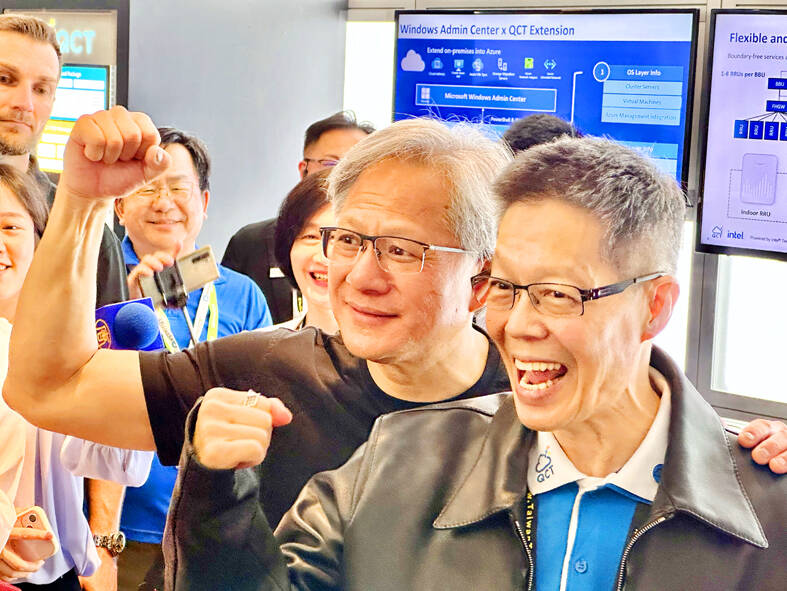Nvidia Corp’s partner Quanta Cloud Technology (QCT, 雲達科技) expects to double sales of its artificial intelligence (AI) servers next year and for long-term demand to persist as businesses weave AI into their operations and services.
QCT president Mike Yang (楊麒令) said in a Bloomberg Television interview that the AI boom “actually is going to maintain and you’ll see its growth keeping stronger and stronger for the upcoming years.” QCT is the owned subsidiary of Quanta Computer Inc (廣達電腦).
Quanta Computer, which works with Nvidia to build AI servers, has benefited greatly from Wall Street’s bet on the technology being the next big thing. Like its Santa Clara, California-based chipmaking partner, Quanta’s share price has more than doubled this year.

Photo: Fang Wei-chieh, Taipei Times
Component providers are working together to boost production capacity and help alleviate an ongoing shortage of Nvidia’s cutting-edge AI chips, Yang said, without committing to fulfilling all demand from customers by next year. Nvidia executives told analysts last month they were confident of expanding supply to meet heightened demand.
“We have a very much limited supply, but next year I think Nvidia will solve everything,” Yang said.
QCT generates billions of dollars in revenue annually, with AI servers accounting for 65 percent of its total sales, Yang said. He differentiates AI servers as those that include graphics processors, such as models made by Nvidia, versus traditional processor-driven hardware where Intel Corp still has a dominant share.
Alphabet Inc’s Google Cloud, Amazon.com Inc’s AWS and Alibaba Group Holding Ltd (阿里巴巴) are among QCT’s biggest customers. The company competes with the likes of Shanghai-listed Foxconn Industrial Internet Co (工業互聯) and Taiwanese peer Wiwynn Corp (緯穎科技) to provide servers for cloud service providers, mainly in the US and China.
Global shipments of AI servers are expected to grow at a compound annual rate of 29 percent between last year and 2026, according to Taipei-based research firm TrendForce Corp (集邦科技). Estimates from analysts and researchers have been overly conservative this year, as Nvidia has in successive quarters shocked the market with blowout sales forecasts.
Yang enjoyed a moment in the spotlight in late May when Nvidia CEO Jensen Huang (黃仁勳) visited QCT’s booth at the Computex trade show in Taipei. Huang offered his signature leather jacket for Yang to wear during their joint marketing event. Yang said that the two companies first started working together to develop server products in 2015.
Like many other manufacturers, Yang is keeping a wary eye on the US-China trade conflict. The executive said QCT is looking to grow its production lines in the US, Germany and Thailand, while maintaining existing capacity in China, though he also said firms cannot afford to dismiss China as a major market.
“I still believe China is the biggest market,” Yang said. “I do believe people will still focus on both. China and the rest of the world.”

Taiwan Semiconductor Manufacturing Co (TSMC, 台積電) would not produce its most advanced technologies in the US next year, Minister of Economic Affairs J.W. Kuo (郭智輝) said yesterday. Kuo made the comment during an appearance at the legislature, hours after the chipmaker announced that it would invest an additional US$100 billion to expand its manufacturing operations in the US. Asked by Taiwan People’s Party Legislator-at-large Chang Chi-kai (張啟楷) if TSMC would allow its most advanced technologies, the yet-to-be-released 2-nanometer and 1.6-nanometer processes, to go to the US in the near term, Kuo denied it. TSMC recently opened its first US factory, which produces 4-nanometer

GREAT SUCCESS: Republican Senator Todd Young expressed surprise at Trump’s comments and said he expects the administration to keep the program running US lawmakers who helped secure billions of dollars in subsidies for domestic semiconductor manufacturing rejected US President Donald Trump’s call to revoke the 2022 CHIPS and Science Act, signaling that any repeal effort in the US Congress would fall short. US Senate Minority Leader Chuck Schumer, who negotiated the law, on Wednesday said that Trump’s demand would fail, while a top Republican proponent, US Senator Todd Young, expressed surprise at the president’s comments and said he expects the administration to keep the program running. The CHIPS Act is “essential for America leading the world in tech, leading the world in AI [artificial

REACTIONS: While most analysts were positive about TSMC’s investment, one said the US expansion could disrupt the company’s supply-demand balance Taiwan Semiconductor Manufacturing Co’s (TSMC, 台積電) new US$100 billion investment in the US would exert a positive effect on the chipmaker’s revenue in the medium term on the back of booming artificial intelligence (AI) chip demand from US chip designers, an International Data Corp (IDC) analyst said yesterday. “This is good for TSMC in terms of business expansion, as its major clients for advanced chips are US chip designers,” IDC senior semiconductor research manager Galen Zeng (曾冠瑋) said by telephone yesterday. “Besides, those US companies all consider supply chain resilience a business imperative,” Zeng said. That meant local supply would

Servers that might contain artificial intelligence (AI)-powering Nvidia Corp chips shipped from the US to Singapore ended up in Malaysia, but their actual final destination remains a mystery, Singaporean Minister for Home Affairs and Law K Shanmugam said yesterday. The US is cracking down on exports of advanced semiconductors to China, seeking to retain a competitive edge over the technology. However, Bloomberg News reported in late January that US officials were probing whether Chinese AI firm DeepSeek (深度求索) bought advanced Nvidia semiconductors through third parties in Singapore, skirting Washington’s restrictions. Shanmugam said the route of the chips emerged in the course of an